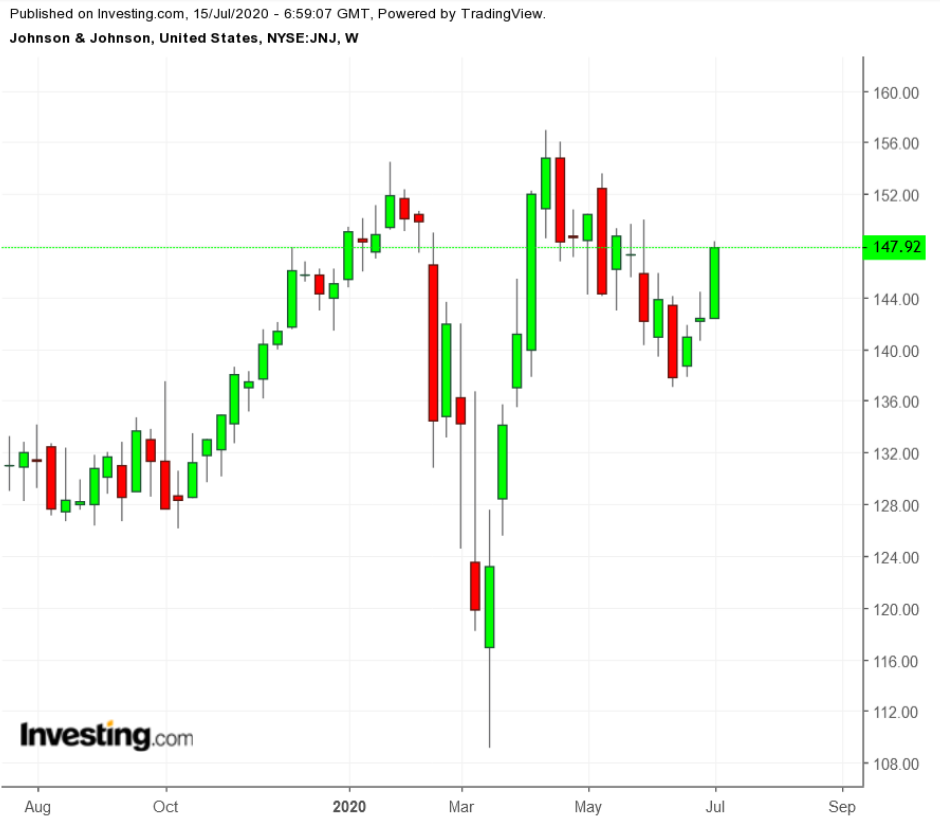- Reports Q2 2020 results on Thursday, July 16, before the market open
- Revenue Expectation: $17.5 billion
- EPS Expectation: $1.47
Perhaps now is not the time to expect a blow-out quarter from healthcare giant, Johnson & Johnson (NYSE:JNJ) when it releases second-quarter earnings results on Thursday. The COVID-19 pandemic has hurt sales and left any future outlook uncertain. What’s commendable though, for the New Brunswick, New Jersey-based company is its business diversity and financial strength.
The world’s largest maker of both consumer and pharmaceutical healthcare products is among a handful of mega-cap companies that have been able to provide full-year guidance during this global health crisis.
While JNJ’s medical devices business is suffering, as elective surgeries are being delayed to clear space for coronavirus patients, demand for its consumer brands such as the pain reliever Tylenol, Johnson's baby products and its Neutrogena skincare line is surging.

Due to this diversity of Johnson & Johnson's product portfolio, its shares have performed well during the current volatility. Indeed, they've fully recovered from the March dip. The stock closed on Tuesday at $147.92, up 1.3% YTD, almost unchanged for the year.
According to the company’s latest forecast, sales are likely to fall between $77.5 billion to $80.5 billion this year, a decline of less than 4% from 2019, at the midpoint of the range. However, due to weakness in the lucrative medical device business, profits will be hit harder: J&J expects adjusted earnings of roughly $7.70 a share, which implies a decline of about 11% from a year earlier.
Despite this setback, JNJ has enough financial muscle to deal with the current crisis. The company had $18 billion in cash and securities at the end of the first quarter and generated $3 billion in free cash flow.
Dividend Strength
Investors who hold JNJ shares aren't looking for momentum. Rather, they're primarily interested in the company’s dividend hikes and the stability of its stock.
The company has raised its dividend every year for the past 57 years, with at least 50 consecutive annual increases. In April, JNJ increased its quarterly dividend by 6.3% to a payout of $1.01 per share every three months, from $0.95. The stock currently yields 2.8% and has a healthy payout ratio of 58.41% which means there remains plenty of runway for additional hikes going forward.
As such, we see little risk to its dividend, a result of the company’s strong cash flows and its leading position in many areas of the healthcare industry. Its blockbuster immunology drug Stelara, approved for use by the FDA in 2016 and cancer drugs Darzalex, approved in 2015 and Imbruvica, approved in 2016, are still contributing to the ongoing sales growth from the company’s pharmaceutical unit.
With this strength, however, there remain some risks to the company’s latest forecast. These include the duration of the pandemic and its severity in the fall and winter, government restrictions, potential supply chain disruptions and ongoing delays and cancellations of medical procedures.
The decline in medical procedures not related to the coronavirus has already weighed on JNJ’s medical device business. Revenue in that business fell 8.2% in Q1. Investors will be keen to know how this is recovering when the company releases its latest earnings as the economies reopen globally.
Another negative surprise could come from the consumer division where the spike caused by the “pantry loading” phenomenon evaporates as consumers slow their emergency purchases.
Bottom Line
JNJ’s diversified business model and the stability of its dividend make it a safe bet during the current environment of uncertainty. The company’s earnings release on Thursday will likely show this strength.
